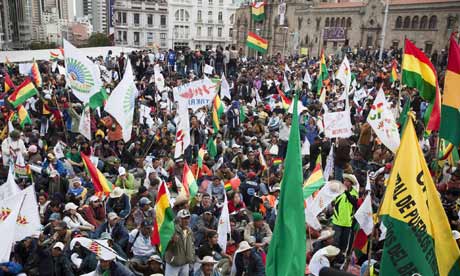Indigenous protesters march against jungle highway
Lowland indigenous people reach La Paz after 63 days marching in protest against Bolivian Amazon road
More than 1,000 indigenous people opposing a jungle highway that they say will spoil their lands in Bolivia's Amazon have reached the world's highest capital after a 63-day protest march.
Their trek, including a failed attempt by police to break up the march two weeks ago, has won widespread sympathy and fuelled charges that the leftist president, Evo Morales, discriminates against Bolivia's Amazon-based indigenous groups in favour of the highland people who dominate his government and the National Assembly.
"He doesn't care about his brothers from the lowlands," said Fernando Najera, a 35-year-old Siriono with tattered sandals who met the protesters who walked to La Paz from the Isiboro-Secure nature preserve, which would be crossed by the proposed highway.
Najera's sentiments are shared by many lowlands people who believe this poor Andean nation's first indigenous president considers them second-class citizens and favours his own people, the Aymara, and the other highland group, the Quechua.
But after the march ended on Wednesday at a plaza in central La Paz, the protest leader Fernando Vargas and indigenous legislator Pedro Nuni said the intent was not to topple Morales but to find a solution to their complaints. The communications minister, Ivan Canelas, said indigenous leaders were considering meeting Morales on Thursday.
Morales has said the highway is needed to help Bolivia's poorer regions develop and has accused the marchers of being dupes of rightwing groups. Protesters say the 190-mile (300km) highway would despoil the Isiboro-Secure preserve, a park that is home to 15,000 indigenous people.
Frictions among indigenous communities have been a problem in Bolivia. About 62% of Bolivians identify themselves as indigenous, and the majority of these are Aymara or Quechua.
Quechuas and Aymaras have long migrated from their home grounds in the arid, windswept highland plains in search of opportunity in the eastern lowlands where the earth is fertile and life is easier.
"The president doesn't respect the 'plurinational state' that he himself promoted, and he wants to impose on lowlands Indians the culture and customs of the Aymara and Quechua," said Pedro Moye, leader of CIDOB, Bolivia's main lowlands indigenous federation.
Bolivia's new constitution, which Morales championed and voters approved, declares its 36 native groups semi-autonomous. In practice, his government has struggled to honour that mandate.
Some critics accuse Morales of ignoring it altogether, of turning his back on indigenous peoples who, accounting for more than three in five Bolivians, gave him their votes as he promised to empower its long-suppressed natives.
"He's not even favouring the Aymaras and the Quechuas," said Fernando Vargas, one of the protest leaders. "He's only favouring coca growers and colonisers."
As the struggle over the Brazilian-funded highway through the nature preserve became heated, Morales accused lowlands indigenous people of being tools of US provocateurs.
"They are trying to divide us so that the colonial state returns," he said last week.
By that time, the failed police crackdown had prompted many highlands indigenous people and educated Bolivians to rally behind the anti-highway protesters. A nationwide protest drew tens of thousands of supporters.
Morales has apologised to the marchers, and denies he ordered the police crackdown. He also announced the suspension of the highway, saying he will let voters in the affected region decide its fate.
A week ago tens of thousands of highlands people, coca growers and union members marched in support of Morales in the dispute.
http://www.guardian.co.uk/world/2011/oct/20/indigenous-protesters-march-highway

No comments:
Post a Comment